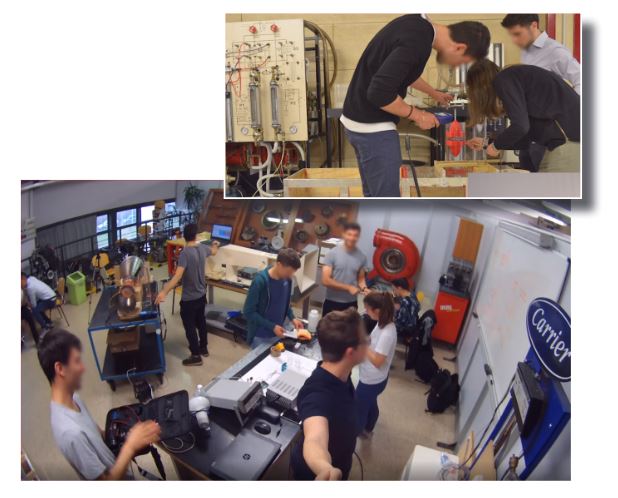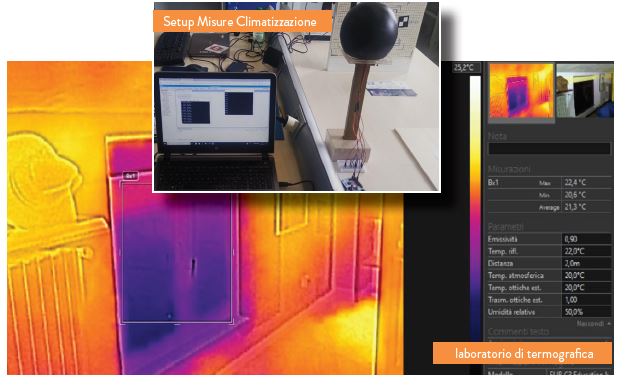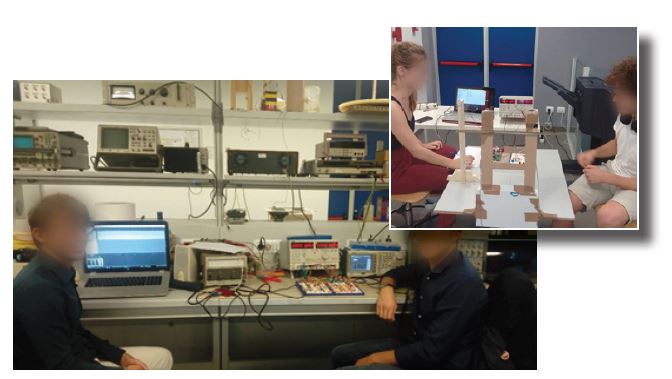Laboratories
Laboratories – Bachelor of Science
In the past years, the Energy Engineering course has invested a lot of resources to activate several laboratory activities at the end of the third year:
• to enhance the knowledge acquired in the courses through their practical application;
• to integrate this knowledge in a multidisciplinary context as the laboratory activity is where different skills are required;
• to develop transversal skills, better known as soft skills, with particular attention to problem solving, teamwork, communication of results;
• to prepare for the technical-scientific horizon of the master courses.
There is a wide range of opportunities, including five courses, the combinations of which are illustrated in the study plan:

Energy Engineering Laboratory
This course aims at: deepening specific experimental techniques of energy, conducting laboratory tests, either guided or autonomous, processing of the results, visits to industrial laboratories and energy plants focusing on measurement as well as control systems.
Expected learning outcomes
At the end of the course the student will have had the opportunity to face the different phases of the experimental process, in particular:
• will be able to schematize a complete experimental layout with the related measurement instrumentation;
• will be able to associate the mathematical models with the measures used for the experimental activity;
• will have learnt the main measurement techniques typical of the energy sector;
• will have applied the scale modeling criteria;
• will have improved their communication and teamwork skills.
Program: LINK

Microgrid laboratory
The course aims to provide the basics of microgrids from the electrical, energy, management and automation points of view. Design and analysis, both theoretical and experimental, of microgrids will be developed during the course. The objectives will be achieved through experimental activities conducted at the Laboratory of Microgrids of the Department of Energy, and numerical simulations with commercial calculation codes.
Expected learning outcomes
Following the course, the student:
• will know the operating principles of microgrids in the different configurations and understand the synergies between the various devices constituting them;
• will be able to describe both qualitatively and mathematically the operating principle of the main devices; • will be able to accurately identify the problems and application constraints in the microgrids;
• will know the design criteria of a microgrid to select the devices for constituting the microgrid;
• will know how to operate a microgrid and the main instrumentation necessary to verify the status of the microgrid.
Program: LINK

Measurements lab for energy engineering
The course aims to illustrate the basic concepts relating to MEMS measurement sensors (temperature, humidity, pressure, acceleration, motion, IMU), to non-contact measurement systems (gray level, color, time-of-day cameras, flight and thermals) and systems for flow and energy measurements, with hints of electrical measurements and notions on electronic instrumentation (multimeter, oscilloscope, function generator, ADC cards).
The laboratory activity will allow students to acquire the skills to design measurement chains to fullfill the accuracy and bandwidth requirements using industrial instrumentation.
Expected learning outcomes
Following the course, the student:
• will know the basic concepts for the design of a measurement and data processing system locally and in the cloud;
• will be able to estimate the overall uncertainty of the measurement system;
• will be able to carry out a basic critical analysis of the components of the acquisition system and of the acquired data.
• will be able to understand and process the relevant information characteristic of a measurement system; • will know how to select the main components of the measurement system;
• will identify the correct acquisition parameters for the specific measurement solution;
• will know how to use industrial and IOT measurement systems with a view to industry 4.0.
• will be able to summarize and present the results of a design and experimental activity.
Program: LINK

Laboratory of Nuclear Engineering
The aim of the course is to teach the basic concepts of metrology and the operation of the main measuring devices used in the industrial sector. In addition, the student will improve the skill to autonomously perform the experimental measurement of some typical phenomena of nuclear engineering.
At the end of the course the student will be able to use and develop a measurement system through consolidated experimental techniques, by choosing the appropriate transducers, knowing how to manage data analysis and critical review of results.
Expected learning outcomes
Following the course, the student:
• will know and use the measurement electronic instrumentation;
• will understand the operation of simple electronic circuits;
• will be capable of collecting and processing electrical measurements;
• will be able to carry out circuit simulation;
• will be able to critically compare the experimental characterizations with the results of the simulations;
• will be able to present and discuss the obtained results;
• will understand the potential of programmable logic devices in industrial engineering;
• will familiarize ùwith the technical specifications of the transducers and actuators;
• will be capable of making simple design choices;
• will be able to present and discuss the project.
Program: LINK